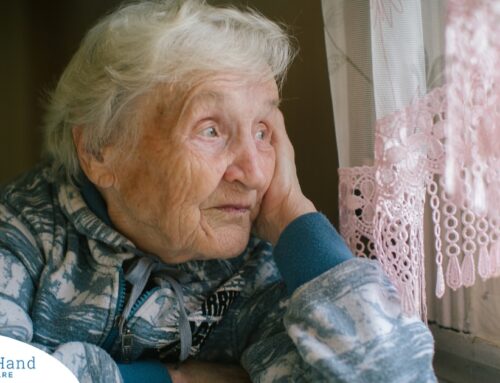Having an aging loved one in Reno, NV diagnosed with Alzheimer’s disease can be a game changer for the entire family. Family caregivers often shoulder the responsibility of caring for their loved ones with Alzheimer’s disease, which can be physically and emotionally demanding.
However, with the right support and information, caring for a loved one with Alzheimer’s disease or another form of dementia can be a gratifying experience. As a family caregiver, including the following tips in your Alzheimer’s and dementia care strategy will help ensure your loved one gets the nurturing they deserve.
What is Alzheimer’s disease?
Alzheimer’s disease is a progressive brain disorder that affects one’s ability to communicate and function properly. The disease is characterized by the abnormal accumulation of protein in the brain, which causes the death of brain cells. The exact cause of Alzheimer’s disease is still unknown, but it is believed to be a combination of genetic, environmental, and lifestyle factors.
As the most common cause of dementia in older adults, Alzheimer’s usually starts slowly and worsens over time, eventually leading to the person’s inability to carry out routine daily tasks.
What Are the Symptoms of Alzheimer’s Disease?
Although the symptoms of Alzheimer’s vary from person to person, they generally involve memory loss, confusion, and difficulty communicating. In the early stages, the person may have difficulty remembering recent events, repeating questions, and losing track of time.
As the disease progresses, the symptoms become more severe. The patient may have trouble recognizing family and friends, experience mood swings, and have difficulty with basic tasks like dressing, bathing, and eating.
What to Expect as Alzheimer’s Progresses
As Alzheimer’s disease progresses, it affects the person’s ability to carry out daily tasks and communicate effectively. The following are some of the ways the disease may affect the person as it progresses:
Memory loss:
One of the most common symptoms of Alzheimer’s disease is memory loss. As the disease progresses, the person may forget the names of loved ones, important events, and even their own identity.
Communication difficulties:
Alzheimer’s disease can make it difficult for someone to communicate effectively. They may have trouble finding the right words, expressing themselves clearly, and understanding others.
Behavioral changes:
As the disease progresses, your loved one may experience mood swings, become more agitated or aggressive, and experience changes in personality. “Sundowning” is often used to describe unusual behaviors that present or become more pronounced during the evening hours.
Difficulty with daily tasks:
Alzheimer’s disease can make it difficult for a person to carry out daily tasks like dressing, bathing, and eating. They may need assistance with these tasks as the disease progresses.
Loss of independence:
Alzheimer’s disease can lead to the loss of independence as the person’s ability to perform activities of daily living (ADLs) declines. They may need more assistance with ADLs and eventually be forced to move into a memory care facility.
How to Assist a Loved One with Alzheimer’s
When you’re a caregiver, navigating the caregiving journey while assisting a loved one with Alzheimer’s disease is possible by taking these steps:
Learn About the Disease
One of the most important things family caregivers can do is to learn as much as possible about Alzheimer’s disease. Understanding the disease and its progression can help you anticipate and prepare for changes in your loved one’s behavior and abilities, allowing you to provide the care and support they need.
Set a Routine
Establishing a routine can help provide structure and predictability for both the caregiver and the care recipient. For example, a daily routine might include regular mealtimes, bedtime, and activities. Furthermore, having a set routine can help reduce confusion and anxiety for the person with Alzheimer’s disease.
Simplify Tasks
Since Alzheimer’s disease can make it difficult for the person to carry out daily tasks, it’s crucial to simplify tasks and break them down into smaller steps. For example, instead of asking the person to get dressed, break it down into smaller steps like putting on socks, then pants, then a shirt. Breaking down tasks can help your loved one feel more successful and reduce frustration.
Be Patient
Because caring for a loved one with Alzheimer’s disease can be so challenging, you must be patient. You can expect them to take longer to complete tasks, repeat themselves, or become agitated or confused. As a result, remember to remain calm and patient, even in challenging situations.
Communicate Effectively
Effective communication is essential when caring for a loved one with Alzheimer’s disease. Be sure to speak clearly and calmly and to use simple words and short sentences. Avoid using complex sentences or asking multiple questions at once. Nonverbal communication, such as facial expressions and body language, can also be helpful when communicating with a person with Alzheimer’s.
Create a Safe Environment
Creating a safe environment is also vital when caring for a loved one with Alzheimer’s disease. Remove any potential hazards, such as loose rugs or electrical cords. Install handrails and grab bars in the bathroom and other areas where the person may need assistance. Consider putting locks or alarms on doors and windows to prevent the person from wandering.
Practice Self-Care
Caring for a loved one with Alzheimer’s disease can be emotionally and physically exhausting. As a result, family caregivers must also take care of themselves. Make time for self-care activities, such as exercise, hobbies, or spending time with friends. Seek support from family members, friends, or a support group. Once fatigue starts to set in, consider hiring a respite caregiver to provide temporary relief from caregiving duties.
Offer Choices
Offering choices can help the person with Alzheimer’s disease feel more in control and may reduce frustration and agitation. For example, instead of asking the person what they want to wear, offer them two choices of outfits to choose from. Providing choices can help someone with Alzheimer’s disease maintain their dignity and independence.
Use Memory Aids
Memory aids can be helpful for both the person with Alzheimer’s disease and the caregiver. Memory aids can include calendars, to-do lists, and labels on drawers and cabinets. Memory aids can help the person with Alzheimer’s disease remember important information and can reduce frustration for the caregiver.
Seek Professional Assistance
Because caring for a loved one with Alzheimer’s disease can be challenging, it’s important to seek professional home care when needed. A trained caregiver can provide guidance or hands-on assistance to manage symptoms, while a geriatric care manager can refer the family to support services.
Bottom line: As a family caregiver, it’s essential to know your limitations and not be afraid to seek professional assistance when caring for a loved one with Alzheimer’s disease.
Dignified In-Home Alzheimer’s and Dementia Care in Reno, NV
When your loved one needs Alzheimer’s or dementia care, look no further than Lend A Hand Home Care in Reno, NV. We are a fully licensed and insured provider with highly trained professionals who are experts at delivering the nurturing your loved one deserves. While serving as an extended family in your senior’s home, our compassionate caregivers can perform various duties, including Alzheimer’s & Dementia Care, Care Assistance and Supervision, Companionship, Light Housekeeping, 24/7 Hourly Care, Meal Preparation, Medication Supervision, and Respite Care.
While assisting clients in Sparks, Verdi, Spanish Springs, Sun Valley, Lawton, Hidden Valley, Carson City, Fernley, and Incline Village, our agency’s focus is maintaining your loved one’s quality of life, along with their dignity, self-esteem, and independence. For your added convenience, all our in-home services can be individually personalized into an affordable package when and where you need them! Please visit Lend A Hand Home Care online now to learn more about us or schedule a FREE initial consultation for a senior in our service area.





